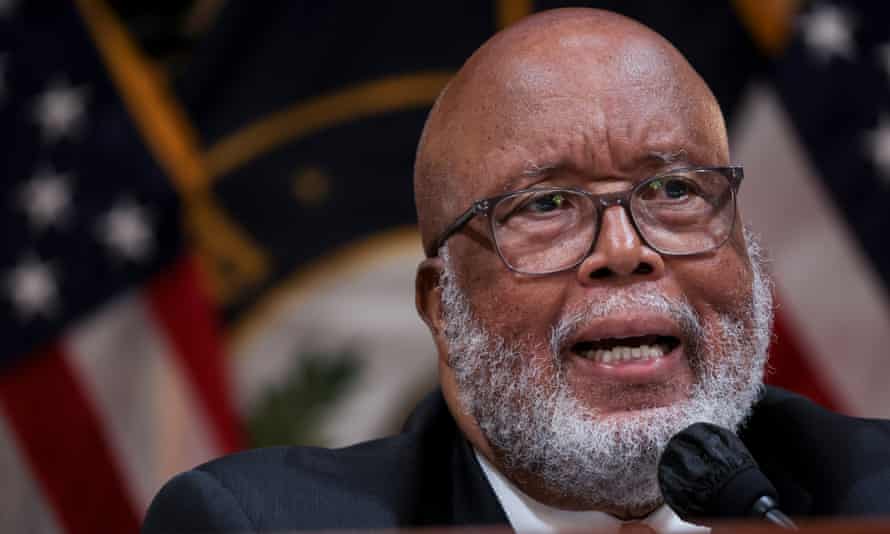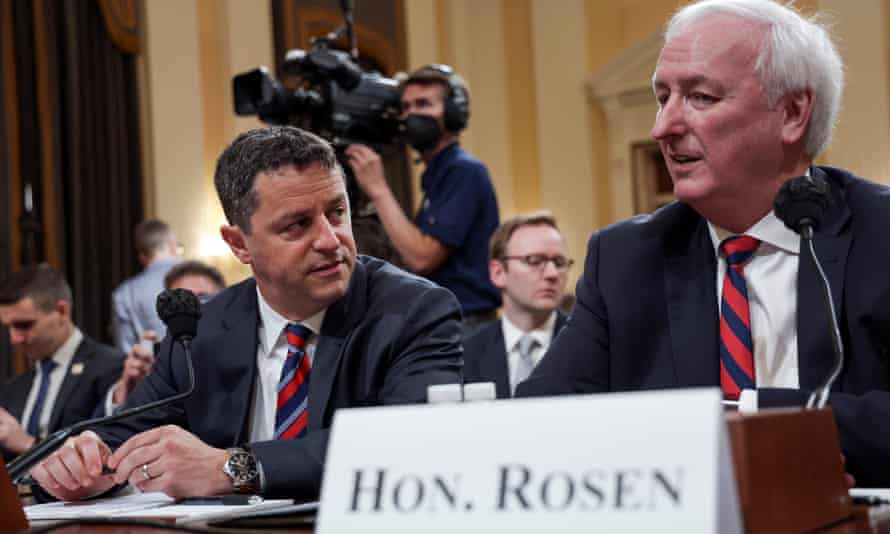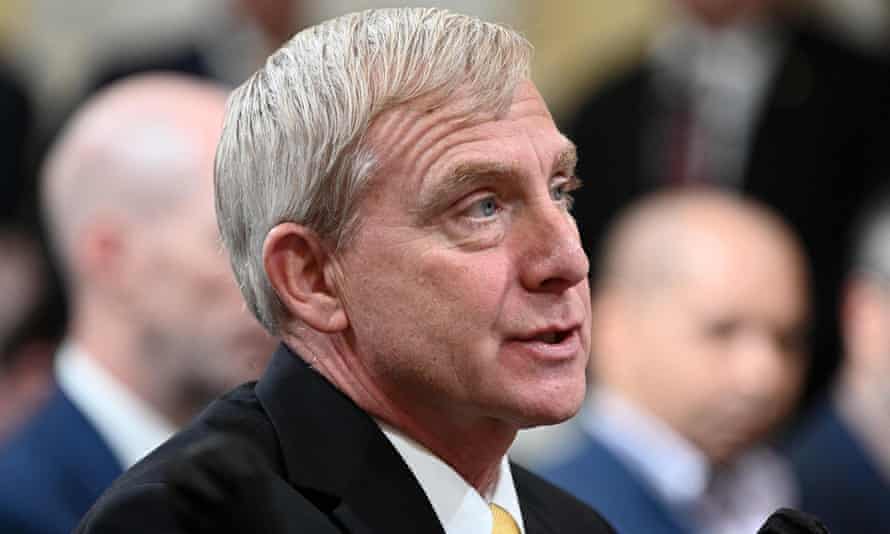
January 6 committee concludes hearings for the month

The January 6 committee has concluded its hearing for the day, with the next sessions expected later in July, when House lawmakers return to Washington from a recess.
In his closing remarks, committee’s chair Bennie Thompson outlined what the committee had found thus far and what it expected to show in the future.
Up to this point, we’ve shown the inner workings of what was essentially a political coup and attempt to use the powers of the government, from the local level all the way up, to overturn the results of the election. Send fake electors, just say the election was corrupt. Along the way, we saw threats of violence, we saw what some people were willing to do. In a service of the nation, the constitution? No. In service of Donald Trump.
When the Select Committee continues this series of hearings, we’re going to show how Donald Trump tapped into the threat of violence, how he summoned the mob to Washington, and how after corruption and political pressure failed to keep Donald Trump in office, violence became the last option.
Mo Brooks, a Republican House representative who has said Donald Trump asked him to try to stop Joe Biden from taking office, announced that he will cooperate with the January 6 committee, under certain conditions.
These including being questioned in public by congressmen on the committee and keeping the subject matter to the attack on the Capitol:
Today, I sent a letter to members of the January 6th Committee explaining my requirements in order to voluntarily submit to a Committee deposition. Read my requirements in the full letter below. pic.twitter.com/vL0qgOuarz
— Mo Brooks (@RepMoBrooks) June 23, 2022
Brooks is leaving Congress after voters rejected his attempt to win the Republican nomination for a Senate seat representing Alabama. He had a complicated relationship with Trump, who at first endorsed him, then un-endorsed him, after which Brooks publicly revealed the president’s request to help him overturn the 2020 election.
January 6 committee concludes hearings for the month

The January 6 committee has concluded its hearing for the day, with the next sessions expected later in July, when House lawmakers return to Washington from a recess.
In his closing remarks, committee’s chair Bennie Thompson outlined what the committee had found thus far and what it expected to show in the future.
Up to this point, we’ve shown the inner workings of what was essentially a political coup and attempt to use the powers of the government, from the local level all the way up, to overturn the results of the election. Send fake electors, just say the election was corrupt. Along the way, we saw threats of violence, we saw what some people were willing to do. In a service of the nation, the constitution? No. In service of Donald Trump.
When the Select Committee continues this series of hearings, we’re going to show how Donald Trump tapped into the threat of violence, how he summoned the mob to Washington, and how after corruption and political pressure failed to keep Donald Trump in office, violence became the last option.
The testimony of the justice department officials who gave the bulk of the day’s evidence has concluded, but before they did, Jeffrey Rosen, the acting attorney general, told a tale familiar to those who have watched the committee’s hearings closely: he never heard from Trump on the day of the attack.
“I spoke to a number of senior White House officials, but not the president,” Rosen said.
What Trump was doing during the attack and who he was talking to are both expected to be focuses of later hearings of the committee.
The committee has just unveiled evidence of more Republican congressmen requesting pardons from Trump in his final days in office.
NEW on PARDONS: Republican congressman Mo Brooks sent an email on 11 January 2021 seeking pardons for “Every Congressman and Senator who voted to reject the electoral college vote submissions of Arizona and Pennsylvania.”
— Hugo Lowell (@hugolowell) June 23, 2022
Trump WH aide Cassidy Hutchinson testified that Brooks and Gaetz pushed for pardons for every Republican lawmaker who participated in Jan. 6 planning meeting — and Reps. Perry, Biggs, Gohmert asked for pardons. Jordan asked whether White House would pardon members.
— Hugo Lowell (@hugolowell) June 23, 2022
The testimony adds to the list of pardon requests that have emerged as the January 6 committee aired its evidence.
Jeffrey Clark came very close to be the acting attorney general, a position in which he could have used his authority to disrupt the certification of Biden’s election win in several states, according to evidence the committee is airing.
On January 3, three days before the attack on the Capitol, the White House had already begun referring to Clark as acting attorney general, according to Adam Kinzinger, the Illinois Republican leading the committee’s questioning today.
The committee then turned to exploring a meeting between Trump and the leaders of the justice department that day in the Oval Office, in which Trump repeated specific claims of fraud that had been debunked and expressed his will to see Clark take over the department.
Richard Donoghue said he warned of mass resignations to follow if Clark took over the department. “You’re gonna lose your entire department leadership. Every single (assistant attorney general) will walk out. Your entire department of leadership will walk out within hours. And I don’t know what happens after that. I don’t know what the United States attorneys are going to do,” Donoghue said. “My guess would be that many of them would have resigned.”
Jeffrey Rosen, the acting attorney general in the final weeks of the Trump administration, is now recounting Trump’s attempt to replace him with Jeffrey Clark, who was playing a major roles in his efforts to have states that voted for Biden overturn their results.
In a meeting on a Sunday, Rosen said Clark “told me that he would be replacing me,” and had made the atypical request to ask to meet him alone, “because he thought it would be appropriate in light of what was happening to at least offer me, that I couldn’t stay on his his deputy.”
“I thought that was preposterous. I told him that was nonsensical,” Rosen said. “There’s no universe where I was going to do that, to stay on and support someone else doing things that were not consistent with what I thought should be done.”
However, Clark also said he would turn down Trump’s offer to replace Rosen if the acting attorney general signed the letter disputing the validity of Georgia’s electors for Biden.
Richard Donoghue recounted that Rosen made the decisions to begin informing other department officials about the quandary, and almost all the assistant attorney generals said they would resign if Trump replaced Rosen with Clark.
Barr ‘not sure’ transition to Biden would have happened without DoJ fraud probe
As this hearing has unfolded, the justice department officials testifying have said they investigated many of the claims of fraud in the 2020 election brought forward by Trump and his allies. The decision to look into these claims in the weeks after polls closed may be more significant than it appears at first glance.
In video testimony aired earlier in the hearing, William Barr, Trump’s attorney general during the election, said be believes that the department’s ability to debunk the false claims of fraud as Trump was making them were essential to allowing Joe Biden to assume office.
“I felt the responsible thing to do was to be… in a position to have a view as to whether or not there was fraud,” Barr told investigators.
“I sort of shudder to think what the situation would have been if the position of the department was, we’re not even looking at this until after Biden’s in office. I’m not sure we would have had a transition at all.”
The committee has returned, and is now asking Jeffrey Rosen, the acting attorney general, about a request from Trump to seize voting machines.
“We had seen nothing improper with regard to the voting machines,” Rosen said he replied, noting that investigators had looked into allegations the machines gave fraudulent results and found nothing wrong. “And so that was not something that was appropriate to do … I don’t think there was legal authority either.”
Richard Donoghue, the former acting deputy attorney general, is recounting a meeting with Trump, in which he pushed him unsuccessfully to seize voting machines. By the end, “The president again was getting very agitated. And he said, ‘People tell me I should just get rid of both of you. I should just remove you and make a change in the leadership with Jeff Clark, and maybe something will finally get done,’” Donoghue said.
Donoghue said he responded: “Mr President, you should have the leadership that you want. But understand the United States justice department functions on facts and evidence, and then those are not going to change. So you can have whatever leadership you want, but the department’s position is not going to change.”

The committee is now in recess, but before they finished, Richard Donoghue described his reaction when he first learned of Jeffrey Clark’s proposed letter to the Georgia legislature asking them to convene to declare alternate electoral college voters.
“I had to read both the email and the attached letter twice to make sure I really understood what he was proposing because it was so extreme to me I had a hard time getting my head around it initially,” Donoghue said.
He responded in writing to Clark’s letter, saying that its allegations were “not based on facts,” and, in his view, “for the department to insert itself into the political process this way, I think, would have had grave consequences for the country. It may very well have spiraled us into a constitutional crisis. And I wanted to make sure that he understood the gravity of the situation because he didn’t seem to really appreciate it.”
Clark himself made a brief appearance in video testimony the committee played before it took its break, responding to questions by asserting his fifth amendment rights and executive privilege.
The committee will reconvene in a few minutes.
One name that’s coming up a lot in this hearing is Scott Perry, the Pennsylvania Republican congressman who the committee said took part in Trump’s plan to pressure the justice department, and in particular install Jeff Clark at its helm.
The committee just showed text messages between Perry and Trump’s chief of staff Mark Meadows, which showed the lawmaker encouraging Meadows to work on promoting Clark. Richard Donoghue also detailed a phone call from Perry where the congressman claimed fraud in the results in Pennsylvania from the 2020 election – which the justice department determined unfounded.
The committee had sought documents and requested an interview with Perry last year, but the Republican refused to comply. Last month, Perry was among a group of congressmen subpoenaed by the committee.

Richard Donoghue, the former acting deputy attorney general, is outlining his efforts to convince the president that the justice department could not interfere with a state’s election.
“States run their elections. We are not quality control for the states,” he recalled explaining to Trump. “The bottom line was, if a state ran their election in such a way that it was defective, that is to the state or Congress to correct, it is not for the justice department to step in.”
But Trump wanted something simpler, Donoghue said.
“That’s not what I’m asking you to do,” Donoghue told the committee Trump said after he explained the department’s position. “Just say it was corrupt and leave the rest to me and the Republican congressmen,” the president said.
Today’s hearing is focusing on the inner workings of the justice department, but as in previous sessions, the committee has tried to make sure the insurrection isn’t far from viewers’ minds.
Case in point: lawmakers just aired video from the day of the attack showing marchers chanting “Do your job!” outside the justice department — evidence that Trump’s most ardent supporters were well aware of the president’s attempts to push government lawyers to interfere with Joe Biden’s victory.
But as justice department officials tell it, they never believed in Trump’s fraud claims. Richard Donoghue, the former acting deputy attorney general, said Trump lawyer Pat Cipollone described the letter Clark wanted to send for Trump as a “murder-suicide pact. It’s going to damage everyone who touches it.”
The committee’s top Republican Liz Cheney is offering more details about the actions of justice department official Jeffrey Clark, who had his house raided today by federal investigators.
According to Cheney, Clark and another justice department lawyer drafted a letter addressed to the Georgia state legislature, which would have said the department had “identified significant concerns that may have impacted the outcome of the election in multiple states, including the state of Georgia”, and that the legislature should convene and consider approving a new slate of electors. Joe Biden had won Georgia, but Trump made baseless allegations of fraud in the polls, and the new electors would have presumably given him the state’s electoral votes.
“In fact, Donald Trump knew this was a lie,” Cheney said. “The Department of Justice had already informed the president of the United States repeatedly that its investigations had found no fraud sufficient to overturn the results of the 2020 election.”
Cheney said Clark had met with Trump privately and agreed to help him sway these states’ legislatures without telling his bosses at the justice department. But Cheney said Clark’s superiors – who are the witnesses testifying today – refused to sign it. That was when Trump began considering installing Clark at the helm at the justice department – which he never ended up doing.
January 6 committee begins fifth hearing
The House committee investigating the January 6 insurrection has started its fifth hearing, which will focus on Donald Trump’s efforts to get the justice department to go along with his plans to overturn Joe Biden’s 2020 election victory. Testifying in the chamber will be:
- Jeffrey Rosen, the acting attorney general for the final weeks of Trump’s term, including during the attack on the Capitol.
- Richard Donoghue, the former acting deputy attorney general, who appeared in a video aired at the conclusion of Tuesday’s hearing threatening to resign if Trump appointed Jeffrey Clark to head the justice department.
- Steven Engel, the former assistant attorney general for the office of legal counsel.

Lauren Gambino
We’re about 10 minutes away from the start of today’s January 6 hearing, which my colleague Lauren Gambino reports will offer new evidence of how Trump pressured the justice department to take part in his plot to overturn the 2020 election:
The House committee investigating the January 6 insurrection plans to present new evidence on Thursday about Donald Trump’s brazen attempts to pressure the justice department to overturn the 2020 presidential election that he lost, aides said.
After exhausting his legal options and being rebuffed by state and local elections officials, the president turned to the justice department to declare the election corrupt despite no evidence of mass voter fraud, the nine-member panel will seek to show in their fifth and final hearing of the month.
Testifying from the Cannon Caucus Room on Capitol Hill are Jeffrey Rosen, the former acting attorney general; Richard Donoghue, the former acting deputy attorney general; and Steven Engel, the former assistant attorney general for the office of legal counsel.


